Paper Folding and Cutting: Meaning, Reasoning Questions, Tricks
Paper cutting and folding reasoning is a popular non-verbal reasoning topic that tests a candidate’s ability to visualize patterns and shapes after a piece of paper is folded and cut in a certain way. These paper folding questions and paper cutting reasoning tricks require strong spatial reasoning skills and quick mental visualization. Whether you are practicing paper cutting and folding questions PDF for revision or learning new paper folding questions tricks, understanding the step-by-step logic is essential. The concept often appears in competitive exams like SSC, RRB, Banking, CAT, and other aptitude tests. In this article, we will discuss the fundamentals, provide solved examples, share useful paper cutting reasoning tricks, and guide you with practice questions for better preparation.
This Story also Contains
- What is Paper Cutting and Folding Reasoning?
- Types of Paper Folding
- Paper Folding Questions Tricks and Techniques
- Paper Cutting
- Study Resources for Paper Cutting and Folding
- Paper Cutting Reasoning Tricks
- Question Weightage of Paper Cutting and Folding Reasoning in Competitive Exams
- Non-Verbal Reasoning Tips
- Paper Cutting and Folding Reasoning Questions for Practice
- Practice Questions for Paper Cutting
- Paper Folding Questions for BITSAT/ TANCET
- Paper Folding Questions for SSC MTS/ SSC CHSL/ SSC Stenographer Exams
- Practice Questions on Paper Folding and Cutting
- Paper Cutting and Folding Questions for SSC CGL/ SSC CPO/ Railway Recruitment Board Exams
- Verbal Reasoning Tips
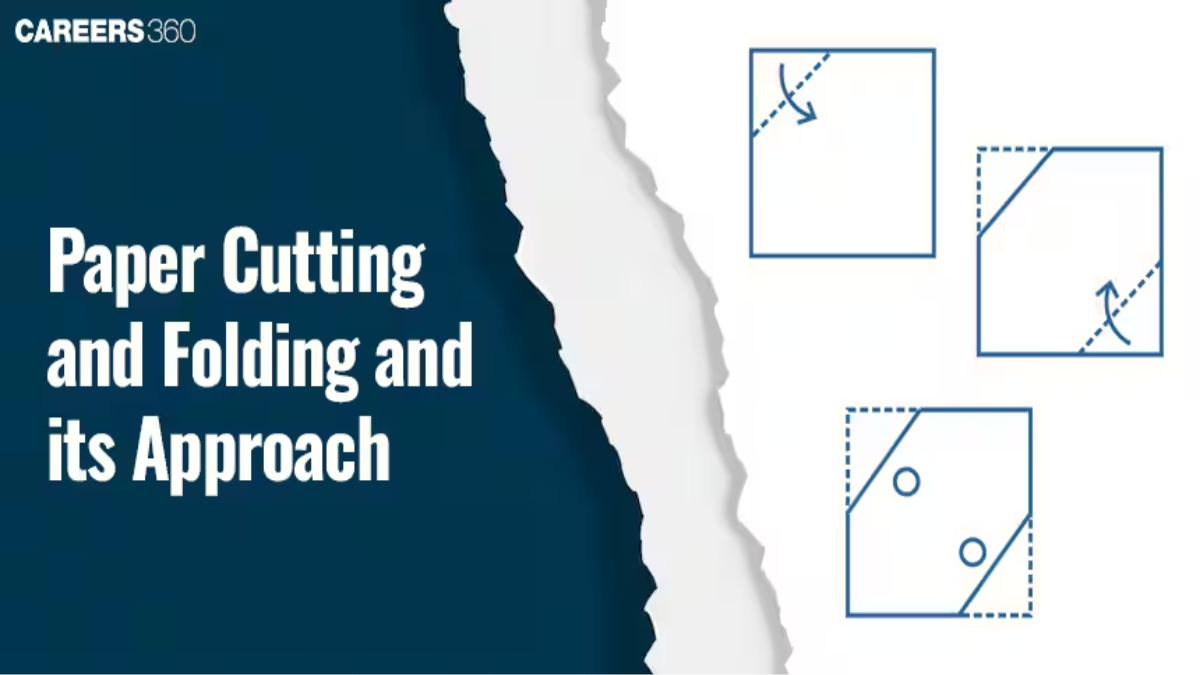
What is Paper Cutting and Folding Reasoning?
Involves folding a piece of paper, cutting or punching it, then predicting the unfolded pattern.
Commonly framed as “a piece of paper is folded and cut as shown” followed by answer choices.
Requires quick mental visualization without actually folding the paper.
Practicing through paper cutting questions PDF and paper folding questions tricks helps improve speed.
Importance of Paper Folding Reasoning in Competitive Exams
Frequently appears in SSC, RRB, Banking, CAT, and other aptitude tests.
Tests spatial reasoning, logical analysis, and accuracy under time pressure.
Using paper cutting reasoning tricks can save valuable exam time.
Many aspirants revise with paper folding and cutting reasoning questions PDF before the exam.
Skills Tested in Paper Folding and Cutting Reasoning
Mental rotation – imagining how folds and cuts will appear when unfolded.
Pattern recognition – identifying symmetry, repetition, or mirror images.
Spatial orientation – understanding shapes in different positions.
Regular practice improves accuracy in paper folding reasoning questions.
Types of Paper Folding
In paper folding, we have a paper or sheet, and the steps of paper folding are given, and an aspirant has to determine how the pattern looks when the paper is folded based on the types of paper. There are two types of paper or sheets in paper folding -
a) Solid Sheet
b) Transparent Sheet
Let’s understand these types in detail -
a) Solid Sheet
When the sheet is solid in paper folding, only the upper pattern of the sheet is visible after folding the paper.
Example:
Directions: Find out from among the four alternatives how the pattern would appear when the solid sheet is folded at the dotted line.
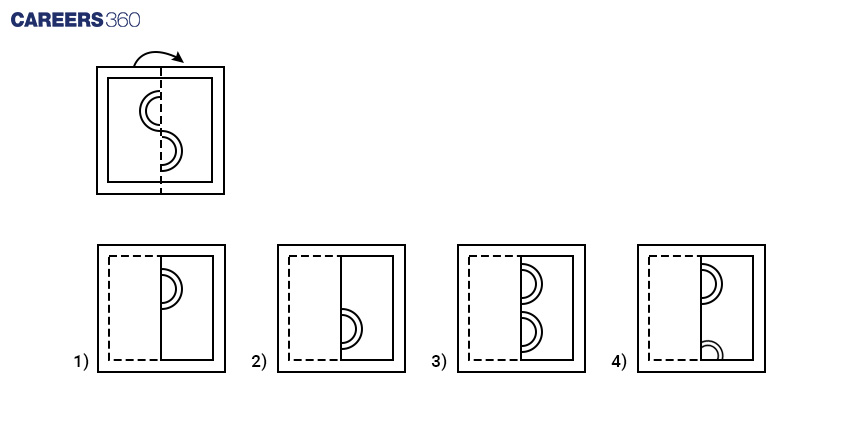 Solution:
Solution:
After folding the transparent sheet it will look like -

Hence, the fourth option is correct.
b) Transparent Sheet
When the sheet is transparent both part of the sheet is visible. So, aspirants have to, carefully visualize the pattern.
Example:
Directions: In each of the following problems, a square transparent sheet with a pattern is given. Figure out from among the four alternatives how the pattern would appear when the transparent sheet is folded along the dotted line.

1) a 2) b 3) c 4) d
Solution:
After folding the transparent sheet it will look like -

Hence, the fourth option is correct.
Paper Folding Questions Tricks and Techniques
Paper folding reasoning involves predicting the final pattern after a piece of paper is folded and sometimes punched or cut. It tests spatial visualization and symmetry recognition skills. Using smart techniques can make solving these questions quicker and more accurate. Below are some useful paper folding questions tricks and techniques for better performance.
Step-by-Step Paper Folding Reasoning Tricks
Read the question carefully to understand the fold sequence.
Visualize each fold before moving to the next one.
Predict the cut or punch placement after the final fold.
Use paper folding questions tricks to eliminate impossible answer choices quickly.
Practice with paper folding and cutting reasoning questions PDF to master the sequence.
Visualizing Paper Folding in Your Mind
Imagine the paper as transparent to see how folds overlap.
Track the position of cuts through each fold.
Break complex folds into smaller, easier steps.
Use symmetry rules to predict identical sections without unfolding mentally every time.
Paper Cutting
In paper cutting, a paper or sheet is folded in a particular direction and after that paper cutting is performed then an aspirant has to visualize how the pattern on the paper looks when the paper is unfolded.
Approach to Solve the Questions Based on Paper Cutting and Folding
To find the answer, observe the steps for paper folding and cutting as shown in the question and then try to visualize how the paper looks when the paper is unfolded.
Example:
Directions: In the following question, a piece of paper is folded and cut as shown below in the question figures. From the given answer figures, indicate how it will appear when opened.
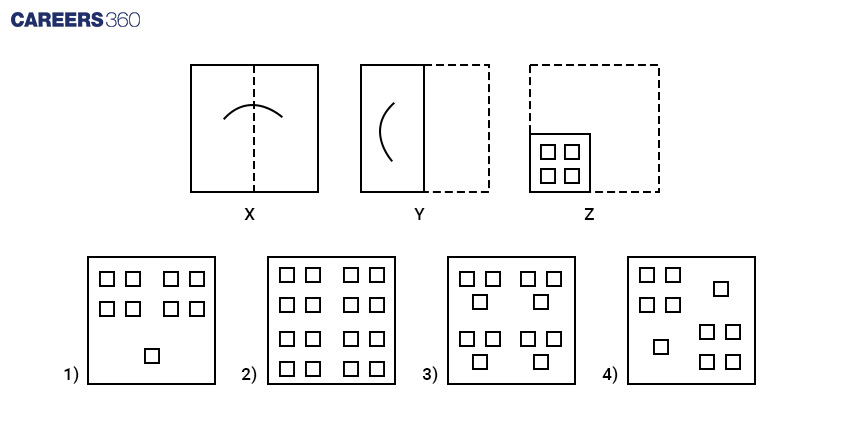
Solution:
After unfolding the folded paper it will look as -

Hence, the second option is correct.
Study Resources for Paper Cutting and Folding
The following are the recommended sources for the practice of the questions of paper folding and cutting-
a) A Modern Approach to Verbal & Non-Verbal Reasoning by R.S. Aggarwal
b) Analytical Reasoning by M.K. Pandey
c) Logical and Analytical Reasoning by A.K. Gupta
d) Test of Reasoning by Edgar Thorpe
Paper Cutting Reasoning Tricks
Paper cutting reasoning tests your ability to visualize how a folded and cut piece of paper will appear once unfolded. It requires quick mental imagery, understanding of symmetry, and recognition of repeating patterns. Mastering a few shortcut methods can greatly improve speed and accuracy in exams. Below are some effective paper cutting reasoning tricks to help you solve such questions faster.
Shortcut Methods for Solving Paper Cutting Questions
First, count the number of folds to estimate how many identical shapes will appear.
Apply paper cutting reasoning tricks to quickly predict repeated patterns.
Eliminate answer options that show an incorrect number of shapes.
Identifying Symmetry and Repeated Patterns
Check if the cuts are symmetrical along the fold lines.
Use mirror image logic for vertical folds and rotational symmetry for diagonal folds.
Recognise patterns that repeat due to multiple folds.
Question Weightage of Paper Cutting and Folding Reasoning in Competitive Exams
The number of questions based on paper cutting and folding reasoning varies from exam to exam.
1) Paper folding and cutting is asked in SSC exams, i.e. SSC MTS, SSC CGL, SSC CHSL, SSC CPO, Steno - 1 to 3 questions.
2) Paper folding and cutting questions asked in the RRB exam, i.e. Group D, NTPC, JE, ALP, etc - 1 to 2 questions.
3) Paper folding and cutting questions asked in CUET, NPAT and other college entrance exams - 1 to 2 questions.
Non-Verbal Reasoning Tips
Non-verbal reasoning evaluates your ability to understand and analyze visual information without relying on language. It focuses on identifying patterns, shapes, sequences, and spatial relationships to arrive at the correct answer. These questions are common in aptitude and competitive exams to test logical thinking through visuals. Below are the important non-verbal reasoning topics to prepare.
Paper Cutting and Folding Reasoning Questions for Practice
1. Directions: Find out from among the four alternatives how the pattern would appear when the transparent sheet is folded at the dotted line.
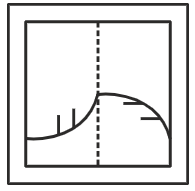
1)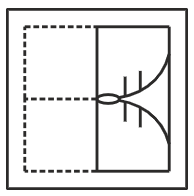
2)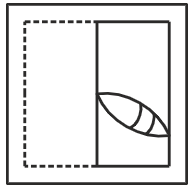
3)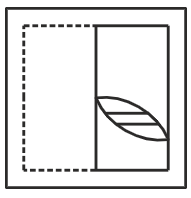
4)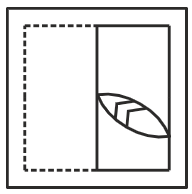
Solution:
When the given transparent sheet is folded, it will look like this –
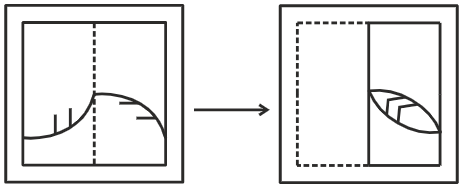
Hence, the fourth option is correct.
2. Directions: Find out from among the four alternatives how the pattern would appear when the transparent sheet is folded at the dotted line.
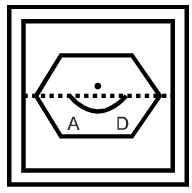
1)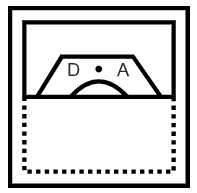
2)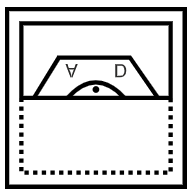
3)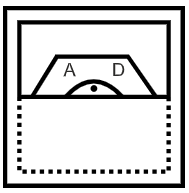
4)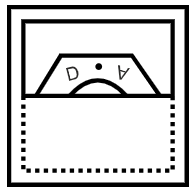
Solution:
When the given unfolded transparent sheet is folded, it will look like –
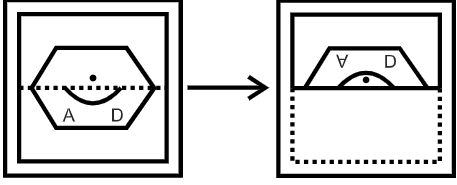
Hence, the second option is correct.
3. Directions: Find out from among the four alternatives how the pattern would appear when the transparent sheet is folded at the dotted line.
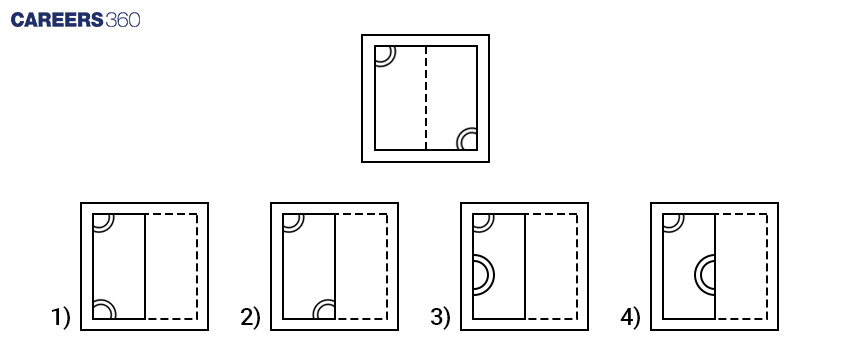
Solution:
When the given unfolded transparent sheet is folded, it will look like –

Hence, the first option is correct.
4. Directions: Find out from among the four alternatives how the pattern would appear when the transparent sheet is folded at the dotted line.
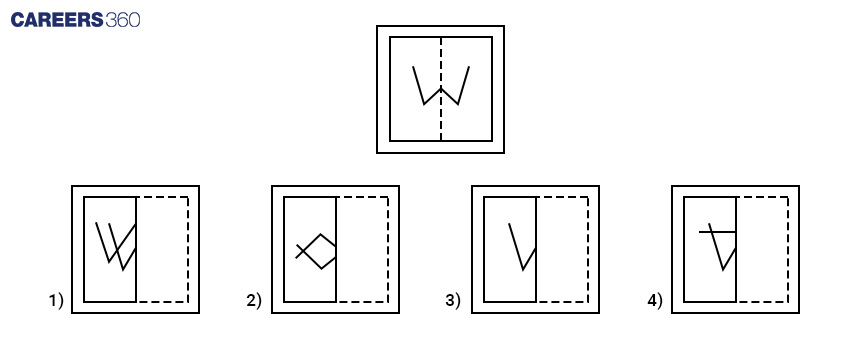
Solution:
When the given unfolded transparent sheet is folded, it will look like –

Hence, the third option is correct.
5. Directions: Find out from among the four alternatives how the pattern would appear when the transparent sheet is folded at the dotted line.
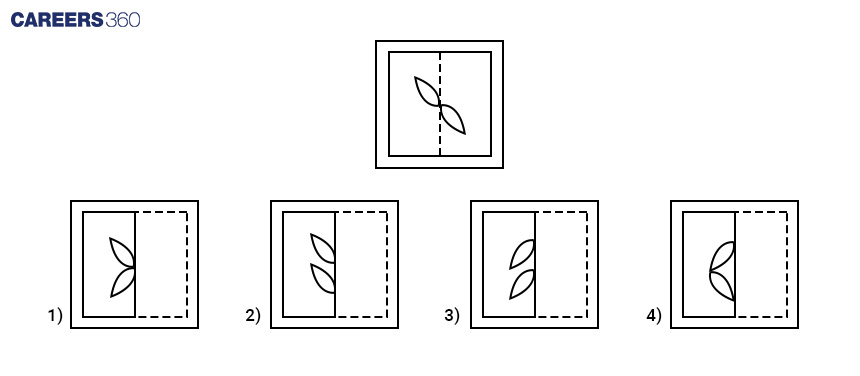
Solution:
When the given unfolded transparent sheet is folded, it will look like –

Hence, the first option is correct.
Practice Questions for Paper Cutting
1. Directions: A piece of paper is folded and punched as shown below in the question figures. From the given answer figures, indicate how it will appear when opened.
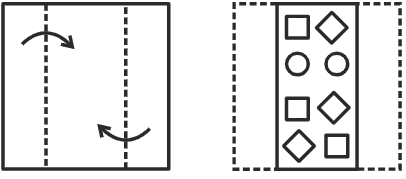
1)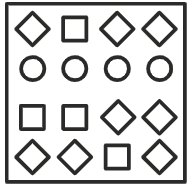
2)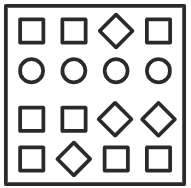
3)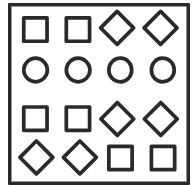
4)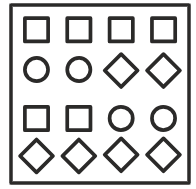
Solution:
When the given paper is unfolded, it will look like –

Hence, the third option is correct.
2. Directions: A piece of paper is folded and punched as shown below in the question figures. From the given answer figures, indicate how it will appear when opened.
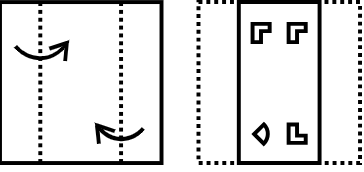
1)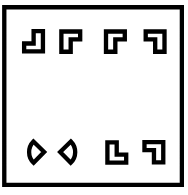
2)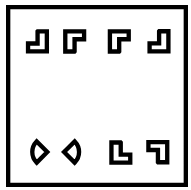
3)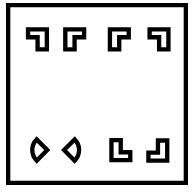
4)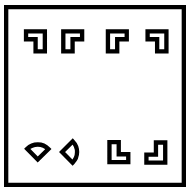
Solution:
When the given folded paper is unfolded, it will look like this –
Hence, the third option is correct.
3. Directions: A piece of paper is folded and punched as shown below in the question figures. From the given answer figures, indicate how it will appear when opened.

1)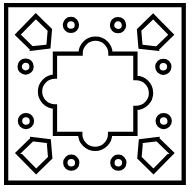
2)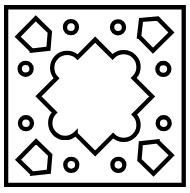
3)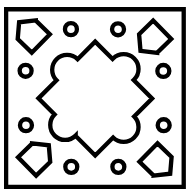
4)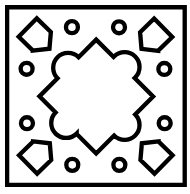
Solution:
When the given folded paper is unfolded, it will look like this –

Hence, the fourth option is correct.
4. Directions: A paper is folded and cut as shown below. How will it appear when unfolded?
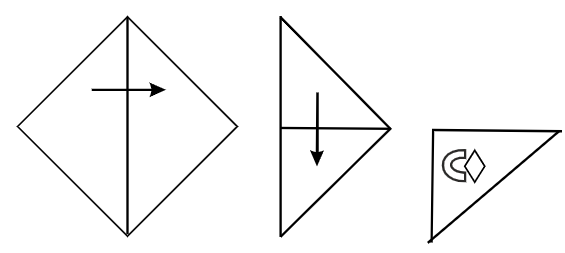
1)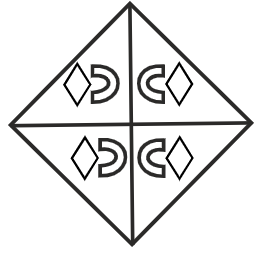
2)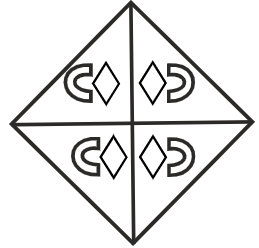
3)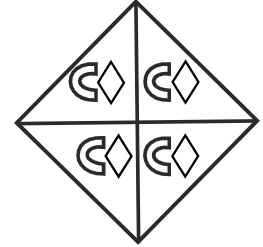
4)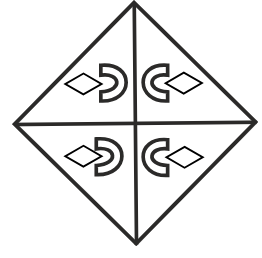
Solution:
When the given paper is unfolded, it will look like this –
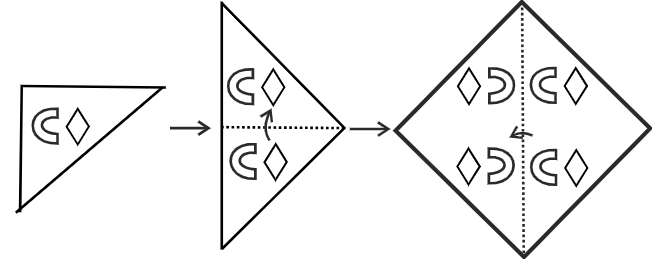
Hence, the first option is correct.
5. Directions: A paper is folded and cut as shown below. How will it appear when unfolded?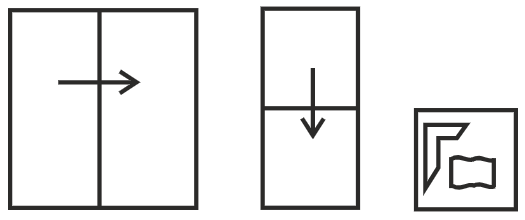
1)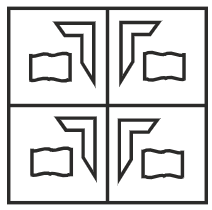
2)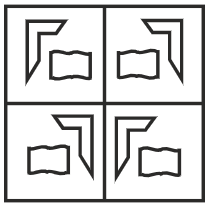
3)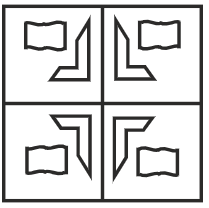
4)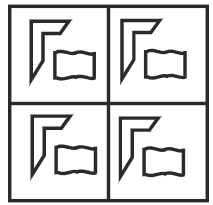
Solution:
When the given folded paper is unfolded, it will look like this–

Hence, the third option is correct.
6. Directions: A piece of paper is folded and cut as shown below in the question figure. Indicate how it will appear when opened.

1)
2)
3)
4)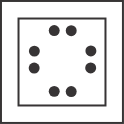
Solution
When the given folded paper is unfolded, it will look like –

Hence, the fourth option is correct.
7. Directions: A piece of paper is folded and cut as shown below in the question figures. From the given answer figures, indicate how it will appear when opened.

1)
2)
3)
4)
Solution:
When the given folded paper is unfolded, it will look like –

Hence, the second option is correct.
8. Directions: A piece of paper is folded and cut as shown below in the question figures. From the given option figures, indicate how it will appear when opened.

1) 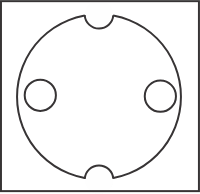
2) 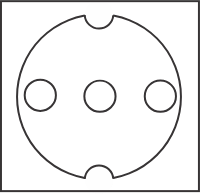
3)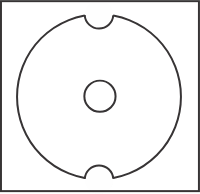
4) 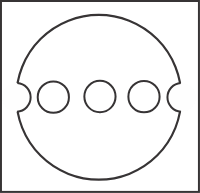
Solution:
When the given folded paper is unfolded, it will look like –

Hence, the second option is correct.
9. Directions: A piece of paper is folded and cut as shown below in the question figures. From the given option figures, select the option that indicates how it will appear when opened.
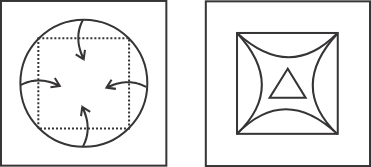
1)
2)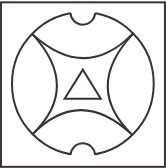
3)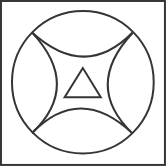
4)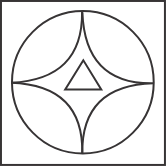
Solution:
When the given folded paper is unfolded, it will look like –
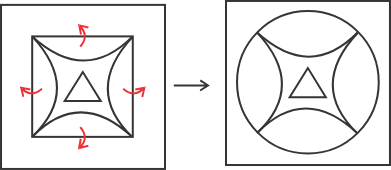
Hence, the third option is correct.
10. Directions: A piece of paper is folded and cut as shown below in the question figure. From the given answer figures, indicate how it will appear when opened.

1) 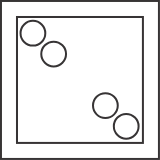
2)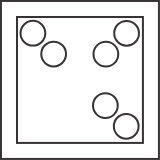
3) 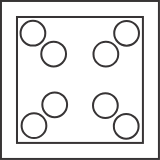
4)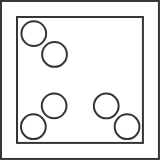
Solution:
When the given folded paper is unfolded, it will look like –

Hence, the third option is correct.
11. Directions: A piece of paper is folded and cut as shown below in the question figures. From the given answer figures, indicate how it will appear when opened.

1)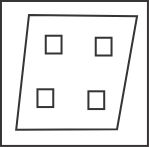
2)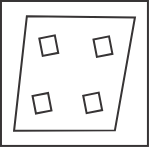
3)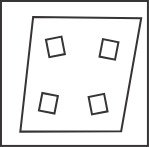
4)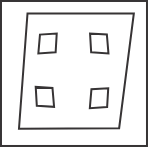
Solution:
When the given folded paper is unfolded, it will look like –

Hence, the first option is correct.
12. Directions: A piece of paper is folded and cut as shown below in the question figures. From the given answer figures, indicate how it will appear when opened.

1)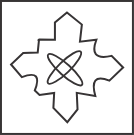
2)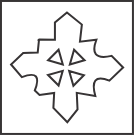
3)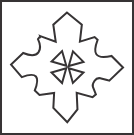
4)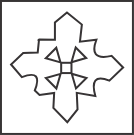
Solution:
When the given folded paper is unfolded, it will look like –

Hence, the third option is correct.
13. Directions: A triangular piece of paper is folded and cut as shown below. Find out from the answer figures how it will appear when opened.
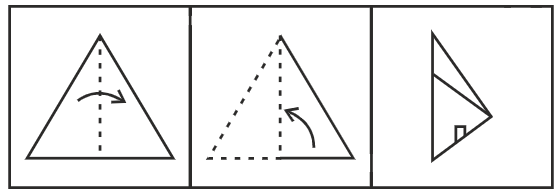
1)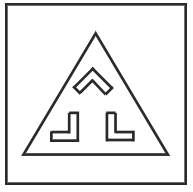
2)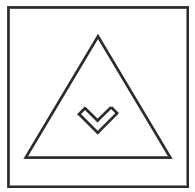
3)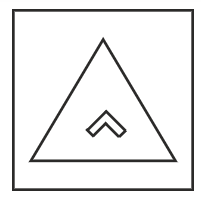
4)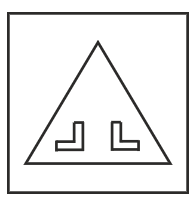
Solution:
When the given folded paper is unfolded, it will look like –
Hence, the fourth option is correct.
14. Directions: A piece of paper is folded and cut as shown below in the question figures. From the given answer figures, indicate how it will appear when opened.

1)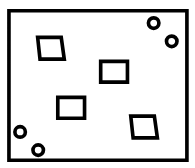
2)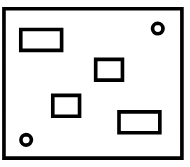
3)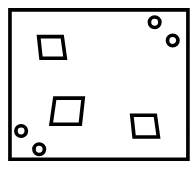
4)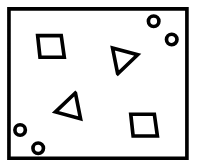
Solution:
When the given folded paper is unfolded, it will look like –

Hence, the first option is correct.
15. Directions: A piece of paper is folded and cut as shown below in the question figures. From the given answer figures, indicate how it will appear when opened.

1)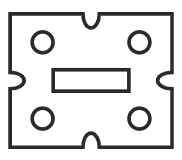
2)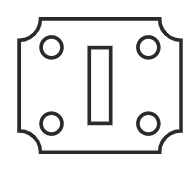
3)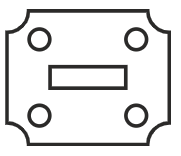
4)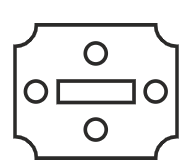
Solution:
When the given folded paper is unfolded, it will look like –

Hence, the third option is correct.
Paper Folding Questions for BITSAT/ TANCET
Generally, 1 -2 questions of paper folding and cutting have been seen in the BITSAT and TANCET exams.
1) Directions: If a paper is folded in a particular manner and a punch is made, when unfolded, this paper appears as given below in the question figure. Find out how the paper is folded and the punch is made from the answer figures given.
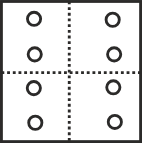
1)
2)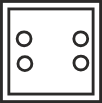
3)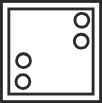
4)
Hint: Analyse the folded pattern of the paper and try to visualize the pattern when it is unfolded.
Solution
When the given unfolded paper is folded, it will look like –

Hence, the fourth option is correct.
2) Directions: A piece of paper is folded and cut as shown below in the question figures. From the given answer figures, indicate how it will appear when opened.

1)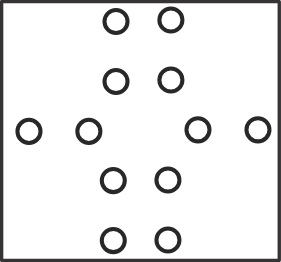
2)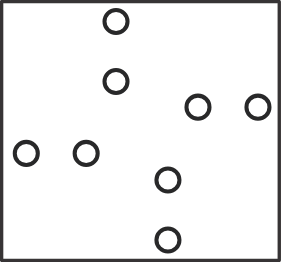
3)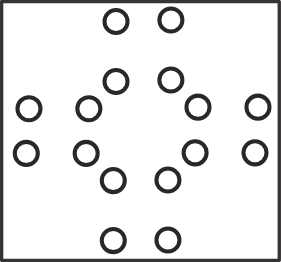
4)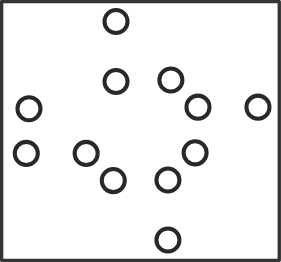
Hint: Analyse the folded pattern of the paper and try to visualize the pattern when it is unfolded.
Solution
When the given folded paper is unfolded, it will look like –

Hence, the third option is correct.
Paper Folding Questions for SSC MTS/ SSC CHSL/ SSC Stenographer Exams
1) Directions: In each of the following questions, a piece of paper is folded and cut as shown below in the question figures. From the given answer figures, indicate how it will appear when opened.

1)
2)
3)
4)
Hint: Analyse the folded pattern of the paper and try to visualize the pattern when it is unfolded.
Solution
When the given folded paper is unfolded, it will look like –

Hence, the second option is correct.
2) Directions: In each of the following questions, a piece of paper is folded and cut as shown below in the question figures. From the given answer figures, indicate how it will appear when opened.

1)
2)
3)
4)
Hint: Analyse the folded pattern of the paper and try to visualize the pattern when it is unfolded.
Solution
When the given folded paper is unfolded, it will look like –

Hence, the third option is correct.
Practice Questions on Paper Folding and Cutting
To understand paper cutting and folding tricks and for more practice, you should click on the link of paper cutting and folding questions PDF download below:
Paper Folding and Cutting Questions with Solutions PDF
Paper Cutting and Folding Questions for SSC CGL/ SSC CPO/ Railway Recruitment Board Exams
1) Directions: A triangular piece of paper is folded and cut as shown below. Find out from the answer figures how it will appear when opened.
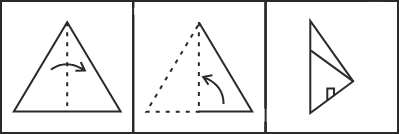
1)
2)
3)
4)
Hint: Analyse the folded pattern of the paper and try to visualize the pattern when it is unfolded.
Solution
When the given folded paper is unfolded, it will look like –

Hence, the fourth option is correct.
2) Directions: A circular paper is folded and punched as shown below. From the responses given find out how it will appear when unfolded.

1)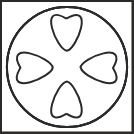
2)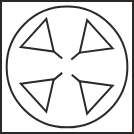
3)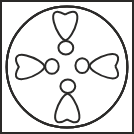
4)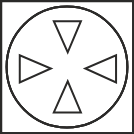
Hint: Analyse the folded pattern of the paper and try to visualize the pattern when it is unfolded.
Solution
When the given folded paper is unfolded, it will look like –

Hence, the first option is correct.
Verbal Reasoning Tips
Verbal reasoning tests your ability to interpret and analyze information presented in a logical format. It involves identifying patterns, relationships, and rules to solve different types of reasoning problems quickly and accurately. These skills are crucial for competitive exams where both speed and accuracy matter. Below are the key verbal reasoning topics you should focus on for effective preparation.
About the Faculty
Tanu Gupta, with over a decade of experience as a reasoning faculty, specializes in preparing students for various entrance examinations and career development. Her extensive work with multiple educational platforms and institutions has honed her expertise in logical and analytical thinking. Her dedication to innovative teaching methods ensures these articles provide practical insights and expert guidance.
Frequently Asked Questions (FAQs)
Standard copier paper is not recommended, as it is too thin and can blunt your blades. Different individuals will have varying preferences, so there is no universally ideal paper to use. Utilize paper with a thickness of approximately 180gsm, while others opt for 130/140gsm. Experiment to discover what suits you best.
While we aim for our children to acquire various skills, fine motor skills—such as cutting and folding paper—are particularly crucial for them to develop. Including activities that involve cutting paper is an excellent method for training your child’s hands.
The paper cutting and folding is defined as a process in which a transparent sheet is folded and then some folds or cuts are made. In the questions based on paper cutting and folding a few images are given showing the way in which a piece is to be folded and then cut from a particular section.
Paper folding and cutting in logical reasoning is a process that starts with the folding of a transparent sheet and ends with the cutting or folding of the same sheet. The ability to analyse a situation is known as analytical ability, whereas the ability to reason logically is called logical reasoning.
The first step for solving the questions of paper folding and cutting is to observe the steps of folding or cutting the paper and then try to, visualize the pattern when the paper is folded or unfolded according to the question asked.
In the SSC, Railways, CUET or Defence exams around 1-2 questions have been asked every year.
To find the answer to the questions follow the steps as given in the question and try to visualize the answer regular practice will help you to determine the answer quickly. You can also use the elimination method to solve the question.
Yes, in paper folding a paper is given and an aspirant has to visualize the pattern when the paper is folded. In paper cutting a paper with some cuts on it and an aspirant has to visualize how the paper looks after the paper is unfolded.